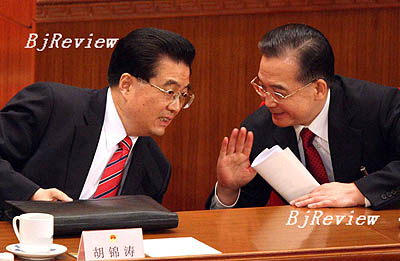|

As an annual routine, the Chinese premier meets with the press after the closing ceremony of each year's session of the National People's Congress (NPC). Wen Jiabao, reappointed premier at the just finished First Session of the 11th NPC, answered questions from domestic and foreign journalists on March 18.
Premier Wen's main points follow:
Inflation control
Wen said that how to control the rising prices and curb inflation is the top priority of the government.
He acknowledged that it will be hard for China to attain its goal of containing the consumer price index (CPI) growth at about 4.8 percent and controlling price hikes this year, and it is made even more difficult by the worst sleet and snow disaster in decades in the first two months of this year.
"But we have no plan to change this goal," he told reporters.
Wen explained that it shows the resolve of the government to control price rises and curb inflation by setting the goal, and it will help stabilize the people's expectations for price rises by doing so. "With prices rising very rapidly, the expectations for price hikes are usually more fearful than the price rises themselves," he said.
In addition, China has set this goal because it has confidence in what it has, Wen said, referring to the country's grain reserves of 150-200 million tons and general oversupply of major industrial products.
"As long as we take the right policies and effective measures, we are fully confident that we can control the excessive rises in prices," he said.
"When mapping out this year's economic policies. The first thing is to prevent the fast-growing economy from overheating, so that we can better address problems surfacing from the economic growth," he said.
"However, China is a developing country with a population of 1.3 billion, which demands that we keep the economy at an appropriate growth rate to confront employment pressure," he said. The problems that emerge on the road ahead shall be resolved through development, he stressed.
"We must strike a balance between economic development and inflation control. Now we have set our 2008 goal for GDP growth at 8 percent and a target for CPI rise at about 4.8 percent, showing that we are trying to hit a balance," he said.
"I know it's a tough task," he added. The year 2008 may be the most difficult year for Chinese economy, largely due to growing uncertainties both inside and outside the country, said Wen. "It will be harder to make decisions."
"We shall keep a close eye on economic changes and trends, take timely and flexible measures in response, and have a good command of the pace, direction and intensity of macroeconomic control measures to ensure steady and fast economic development, creation of about 10 million new jobs and effective control of inflation," he said.
Economic policies
China's adoption of a tight monetary policy and a prudent fiscal policy is based on the country's reality, to address the excessive growth of fixed assets investment, money supply and credit, and the trade surplus, said Wen.
China's economy is already tied to the globalized economy, and, as a result, all kinds of changes and fluctuations in the international economy will inevitably be reflected on China's own economy, said Wen.
"The government will keep a close eye on the latest world economic trends and make flexible, prompt reactions to future changes," he said.
The effects of the government's economic policies would only be seen in the middle and long-term, not within a short span of one or two months, said Wen.
"I myself watch very closely the development in the world economy and the U.S. economy," said Wen. "What concerns me now is that the U.S. dollar is depreciating continuously, and when the U.S. dollar will reach the bottom in this depreciation process, what kind of monetary policy the U.S. government will adopt and where the U.S. economy is heading will draw our close attention."
With regard to the reform of the renminbi exchange rate regime, Wen said that China has let the yuan (a denomination of renminbi) appreciate steadily since July 2005, when the government started to peg the yuan to a basket of currencies.
"The yuan has appreciated about 15 percent against the U.S. dollar in the past two years, with appreciation even faster recently," Wen said.
"No matter what monetary policies are adopted, we shall weigh their advantages and disadvantages and take both aspects into consideration, as the changes in both interest rates and exchange rates have pros and cons." said Wen.
"I know it (how to properly adopt various monetary policies) is a great test to China," he said. "Anyway, China still has good economic fundamentals with huge market potentials, especially in rural areas.
| 